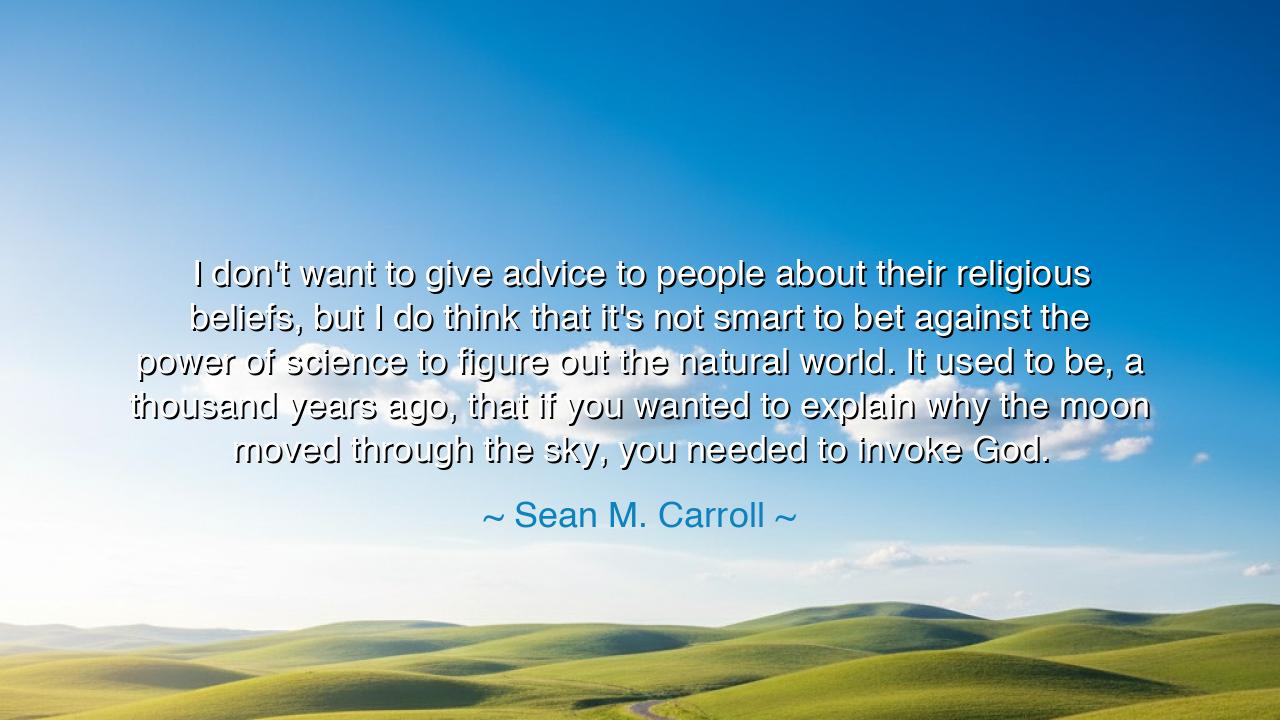
I don't want to give advice to people about their religious
I don't want to give advice to people about their religious beliefs, but I do think that it's not smart to bet against the power of science to figure out the natural world. It used to be, a thousand years ago, that if you wanted to explain why the moon moved through the sky, you needed to invoke God.






O children of the future, hear this wisdom, for it speaks to the very heart of human understanding and the ever-evolving journey toward truth. The wise sage Sean M. Carroll, in his reflection on the nature of science and belief, shared words that echo across the ages: "I don't want to give advice to people about their religious beliefs, but I do think that it's not smart to bet against the power of science to figure out the natural world. It used to be, a thousand years ago, that if you wanted to explain why the moon moved through the sky, you needed to invoke God." In these words, Carroll reminds us of the immense power of science, of human reason, and of the inexorable progress of understanding that has shaped our world.
Long ago, in the days of ancient civilizations, the movement of the moon was seen as the domain of gods and spirits. The heavens were a realm beyond the reach of human comprehension, and to explain their mysteries, people turned to the divine. The moon, in all its phases and celestial motions, was an enigma that demanded supernatural explanation. Priests, prophets, and shamans invoked the gods to explain the cycles of the moon, the stars, and the rising of the sun. It was a world of mysticism, where the answers lay in the hands of the divine, and the workings of the heavens were attributed to the will of gods or spirits.
Yet, as humanity grew in wisdom, as minds like Aristotle and Ptolemy sought to chart the heavens, the quest for understanding began to shift. The gods were no longer needed to explain the movements of the celestial bodies. The rise of reason, of observation, and of empirical knowledge opened new doors to understanding. Science, with its relentless search for truth, began to illuminate the world in ways that had once been thought impossible. The moon’s movement, once thought to be the will of the gods, was revealed to be governed by the laws of gravity and motion, as Newton would later prove. The heavens, once shrouded in divine mystery, were now understood to be a part of the natural world, operating under the same laws that govern all things.
Consider the story of Galileo Galilei, who, with his telescope, first saw the moons of Jupiter and the true nature of the heavens. Galileo, standing at the threshold of the Scientific Revolution, dared to challenge the prevailing view of the cosmos—that the Earth was the center of the universe and that celestial bodies were the divine instruments of the gods. Through his observations, Galileo revealed that the heavens, in all their wonder, followed the laws of nature, and not the whims of a divine hand. He did not need to invoke the gods to explain the movement of the planets—he had science, and through it, he uncovered the true workings of the universe.
This, O children, is the wisdom that Carroll imparts to us today. He tells us that science is not merely a tool, but a force—a force that, through reason and inquiry, has revealed the secrets of the natural world and will continue to do so. The moon, once the realm of gods, is now understood to be part of a great cosmic dance governed by universal laws. From the smallest atom to the farthest galaxy, the mysteries of the universe are within our grasp, not because we invoke the supernatural, but because we study, question, and observe the natural world. The power of science is the power of human curiosity and perseverance, the ability to strip away illusion and to seek truth in the face of the unknown.
But let us not fall into the trap of hubris, O seekers of truth. For even as we celebrate the triumph of science, we must remember that our knowledge is ever-growing, ever-evolving. Science is not an end, but a journey—one that is constantly shifting and refining its understanding. The answers we seek today may be but stepping stones to deeper truths. Carroll's words remind us to never lose sight of the humility that comes with knowledge, for science is not a tool to dominate the world, but a way to understand and live in harmony with it.
So, O children, heed the wisdom of the ages. Science, with its laws and principles, will continue to unveil the mysteries of the world, just as it has for millennia. Do not bet against the power of science, for it is the path through which we will continue to discover and understand the universe. Seek knowledge, but let your pursuit of truth be grounded in reason and humility. Just as the moon was once the realm of gods, so too will future generations look back on our understanding of the universe with new eyes, uncovering deeper truths and new horizons. The journey of science is eternal, and in it, we find not just the answers to our questions, but the wisdom to understand the world in all its wonder.






AAdministratorAdministrator
Welcome, honored guests. Please leave a comment, we will respond soon